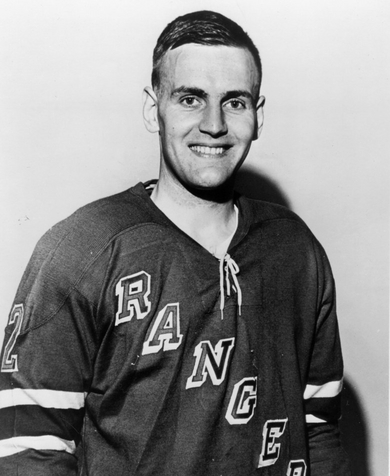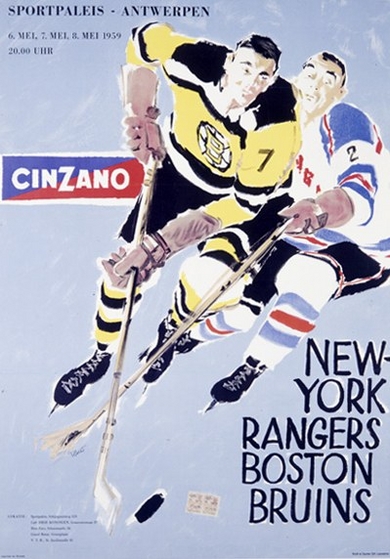NEW YORK – It’s certainly fitting that the New York Rangers will be one of the clubs vying for the inaugural Victoria Cup on October 1st in Bern, Switzerland. The Rangers, the National Hockey League’s flagship franchise in the United States, have after all always been at the forefront of the international hockey scene.
The NHL’s first ethnic Finn, Pentti Lund (who was raised in Canada after his family moved there from Finland when he was very young), won the Calder Trophy as NHL Rookie of the Year in 1949 as a Ranger. The first player born and trained in Europe to ever play in the NHL did so with the New York Rangers – Sweden’s Ulf Sterner, who made his NHL debut on January 27, 1965.
Although Sterner played only four NHL games, the Rangers returned to Sweden in 1978 to sign Anders Hedberg and Ulf Nilsson, becoming the first NHL team to build a team around European players. With the two Swedish superstars coming to New York at the same time as Fred Shero, who had coached Sterner in the AHL thirteen years earlier, the Rangers made an unexpected visit to the Stanley Cup final that season.
 Ulf Sterner was the first European-trained player who played an NHL game.
Ulf Sterner was the first European-trained player who played an NHL game.The Rangers’ rich history with Europe didn’t end there. Just two years later, coach Herb Brooks, who guided the U.S. to their miracle gold medal in the 1980 Winter Olympics, became the first NHL coach to implement a European style of play with the Rangers, and did so successfully. In 1991, the Rangers made Alexei Kovalev the first Russian to be drafted in the first round, and in 1994, Kovalev was one of four Russian players (with Sergei Nemchinov, Sergei Zubov, and Alexander Karpovtsev) to win a Stanley Cup for the first time ever.
The Rangers opened their Cup-winning season in September of 1993 with a pair of exhibition games in Europe, both wins over the Toronto Maple Leafs. They hope the good fortune that followed them back to the NHL that season repeats itself this year when they play four games in Europe – one against host SC Bern the evening before their Victoria Cup match against European club champion Metallurg Magnitogorsk, and two more against the Tampa Bay Lightning in Prague three days later to open the NHL regular season.
But these are hardly the first games the Rangers will have played in Europe. In 1959, they went on a 23-game exhibition tour of six European nations with the Boston Bruins, and in 1981, with Brooks as their newly installed head coach, they played five games in Scandinavia, one in Finland and four in Sweden, the first against the NHL’s Washington Capitals and the other four against local teams.
The Rangers go to Europe this fall not only as a franchise with strong historical ties to Europe, but also with a team that has been deeply influenced by Europeans since the NHL resumed play in 2005 after losing a year to a ruinous lockout.
Before the lockout, the Rangers had fallen on hard times, missing the playoffs seven straight years despite a star-laden roster that included at various times 1994 Stanley Cup heroes Mark Messier, Brian Leetch, Mike Richter, Adam Graves, and Kovalev, along with imported stars such as Pavel Bure, Eric Lindros, Petr Nedved, Luc Robitaille, Theo Fleury, and (without exaggeration) quite a number of others, even the great Wayne Gretzky.
Finally conceding that their strategy of signing expensive big-name free agents was a failure, the Rangers shed all of their stars just before or during the lockout, except for one – they kept Jaromir Jagr, who was in fact the last of the superstars they had brought in during that last season before the lockout.
Emerging from the work stoppage with a new set of rules that limited their ability to spend money and with only a handful of players under contract, the Rangers tried something new. While beginning the process of building the team from the ground up with young players, they signed a good half dozen of Jagr’s friends to tide the team over until those young players were ready to take over. The results were better than anyone expected, the Rangers contending for first place in their division until the last days of the seasons despite being picked to finish last in the league by some pre-season prognosticators.
But it wasn’t just Jagr’s coterie of mostly Czech players (Michael Nylander of Sweden was his hand-picked centerman) that keyed the Rangers’ instant return to respectability. There was also a rookie goalkeeper from Sweden who emerged faster than anyone expected.
Henrik Lundqvist wrested the starting job from veteran Kevin Weekes in the early weeks of the season and has gone on to be a finalist for the NHL’s Vezina Trophy as the best goaltender in the league in each of his first three seasons. He also led Sweden to a gold medal in the Winter Olympics during his rookie NHL season.
With the Rangers expected to contend for the Stanley Cup last season after the acquisition of centers Scott Gomez and Chris Drury in July of 2007, no one envisioned that anyone other than Jagr would be the Rangers’ centerpiece during this year’s trip to Europe, especially with two games scheduled to be played in his native Czech Republic, where he is a huge celebrity.
But Jagr failed to reach the 84 points that were necessary to automatically extend his contract into this season and instead went back to Omsk in Russia to play with the team he skated for during the lockout. With his longtime teammate Martin Straka also ending his NHL career, with fan favorite Sean Avery moving to Dallas, and with veteran leader Brendan Shanahan still unsigned, the Rangers will go to Europe with a roster that has been drastically and unexpected reconfigured.
 Poster in Antwerp, Belgium, during the Rangers-Bruins NHL tour in 1959.
Poster in Antwerp, Belgium, during the Rangers-Bruins NHL tour in 1959.Markus Naslund, the Swedish veteran, replaces Jagr as the team’s go-to goal scorer. Nikolai Zherdev, the enigmatic young Russian winger, will get a chance to mature in a new environment. And Wade Redden, Ottawa’s top defenceman for over a decade, comes in as the first bona fide power play quarterback the Rangers have had since Leetch’s departure in March of 2004.
All three players will be counted on to remedy the one area that may have cost the Rangers better results over the past two seasons – their power play, which was inexplicably unable to win games despite the presence of Jagr and Shanahan, career 600-goal scorers headed for the Hockey Hall of Fame.
The Rangers also brought in a number of new role players this summer, and they will bring a number of their best young prospects with them to Bern for the two Victoria Cup games. Some of the young players who have emerged over the past few seasons – center Brandon Dubinsky, defencemen Marc Staal (one of the famous Staal brothers) and Daniel Girardi, and wingers Nigel Dawes and Ryan Callahan – will be counted on to be even more productive than they have been to date.
Both of the teams they will face in Bern have players who are connected to the Rangers, which makes them all the more interesting as opponents to Ranger fans. The leading scorer for Bern last season was Christian Dubé, a Ranger draftee in 1995 who played 33 games in New York as promising prospect before joining the Swiss League in 1999, where he has gone on to become a perennial star.
Magnitogorsk’s leading scorer was also drafted by the Rangers. Jan Marek, a Czech native, was an eighth-round selection in 2003. The Rangers made several attempts to bring him to North America, but he consistently declined because he was not guaranteed a job in the NHL. As one of the world’s best active players to have never played in the NHL, Marek did not want to give up his starring role in Czech or Russia to play minor league hockey in North America.
Also with Bern is another Ranger draftee, defenceman Phillippe Furrer, who was drafted two rounds earlier than Marek in 2003. Furrer had one chance to impress the Rangers when they brought him to Traverse City, Michigan, in 2006 for the annual Prospect Tournament held there, but they did not offer him a contract and no longer hold his NHL draft rights.
The author Dubi Silverstein is editor and publisher of Blueshirt Bulletin, an independent monthly magazine devoted to covering the New York Rangers.


